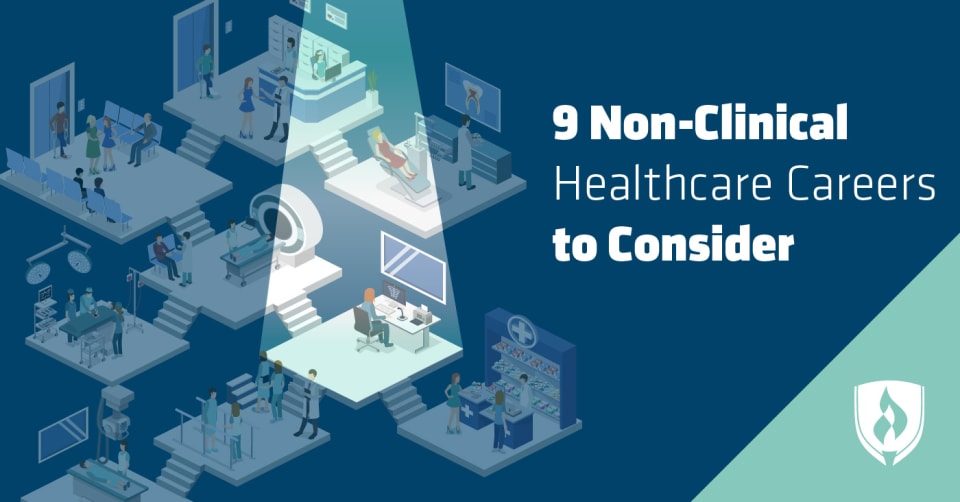9 Non-Clinical Healthcare Careers to Consider
By Ashley Brooks on 05/13/2019

It’s hard to ignore the healthcare field if you’re searching for a stable career. It’s no surprise that it seems like every other job title you come across is related to healthcare. And that bit of hyperbole might not even be that farfetched. The Bureau of Labor Statistics (BLS) reports that the healthcare field is expected to add 2.4 million new jobs from 2016 to 2026—which is more than any other occupational group!1
There’s no denying that there are plenty of opportunities waiting for you in healthcare. While non-clinical nursing jobs do exist, nursing school isn't for everyone. What if you have a weak stomach, or just don’t see yourself working in direct patient care? Luckily you don’t have to work in a clinical setting to take advantage of a career in the booming healthcare industry.
We rounded up nine non-clinical healthcare careers for you to consider as you ponder your future career direction. Picture yourself in these careers to see whether one of them could be the job you’ve been looking for!
9 Healthcare careers that don’t involve clinical work
The healthcare field revolves around caring for people, but it takes more than just doctors and nurses to make it happen. High-quality healthcare gets plenty of support from non-clinical workers who take care of administrative tasks, coordinate care efforts, manage technology and more.
These non-clinical healthcare occupations are a valued part of the medical field and play an important part in keeping the healthcare industry running smoothly. Explore these non-clinical healthcare career descriptions to find the one that’s the best fit for you.
1. Medical coder
In a sense, medical coders are the translators of the healthcare industry. They convert patients’ medical records and physicians’ notes into specially designed codes so insurance companies can accurately bill for the services patients receive. Because these healthcare professionals have access to sensitive patient information, they also need to be well-versed in government regulations surrounding healthcare privacy and electronic health records.
This role may sound simple, but it’s essential work that keeps a healthcare provider’s financial records in tip-top shape. If you’re detail-oriented and don’t mind staying on top of changing regulations, this non-clinical career could be for you.
2. Health information technician
Technology is changing the way the healthcare industry works, especially where electronic health records (EHRs) are involved. Health information technicians (HITs) are the professionals responsible for ensuring that a patient’s EHRs are accurate and secure. They also analyze data on patient outcomes.
Like medical coders, HIT professionals are expected to stay current with regulations about patient privacy. If you’re comfortable with technology, research and analysis, you might find that “health information technician” is the job title for you.
3. Healthcare manager
Healthcare managers oversee the day-to-day operations of a medical department. They set and monitor budgets, train new staff members to their team and look for ways to increase efficiency and quality of care.
Healthcare managers set the tone for their department and their team, so their leadership influences every patient who walks through a facility’s doors. This career might be for you if you’re well organized, enjoy working with others and love the opportunity to make processes better than they’ve ever been before.
4. Medical administrative assistants
Medical administrative assistants, sometimes called medical secretaries, are often the smiling faces you see when you first enter a medical facility. These administrative experts greet patients and provide customer service, schedule appointments, enter insurance information and work with patient billing.
Medical administrative assistants are essential to keeping a healthcare facility running smoothly behind the scenes, and they make patients feel welcome and cared for. Working as a medical secretary could be your dream career if you enjoy administrative tasks and are known for your stellar customer service.
5. Healthcare administrator
Healthcare administrators are the leaders of their medical facility. They set financial goals for their facility, create policies that benefit patient care and ensure that their facility stays in compliance with healthcare regulations.
Healthcare administrators might seem far removed from patient care, but their work directly impacts the quality of care a facility is able to provide. Natural-born leaders and big-picture thinkers could be up to the task of becoming a healthcare administrator.
6. Community health worker
Community health workers focus on improving the well-being of the people in a particular area or region. Their tasks include educating community members on important health issues, reaching out to at-risk populations to improve their health and assisting with disaster preparedness.
These healthcare workers are in the unique position to impact individuals’ general well-being on a large scale. If you have a knack for sharing information, motivating others, and organizing and leading events, community health worker could be the non-clinical career you’ve been looking for.
7. Human service assistants
Human service assistants work with patients to help them arrange the medical care and other services they need. Their work varies depending on the population they serve. Human service assistants who focus on the elderly might help patients arrange transportation to the doctor, set up a meal delivery service or navigate Medicare. Those who work with people with disabilities might help them arrange personal care services or find a job that accommodates their disability.
Human service assistants spend their days making it easier for patients to navigate a complex healthcare system so they can live their lives to the fullest. If you have a gift for scheduling and organization and a love of people, this healthcare career might be right up your alley.
8. Corporate wellness coordinator
Corporate wellness coordinators work at the intersection of healthcare and business. These healthcare pros bring wellness programs to corporations to help their employees improve their overall health—which in turn, gives a boost to the company’s bottom line. They often run fitness initiatives and evaluate individuals for health risks.
This healthcare career puts the spotlight on wellness so individuals can be aware of their risk factors and take control of their health. Consider this non-clinical healthcare career if you have a passion for fitness and nutrition and enjoy sharing your knowledge with others.
9. Patient advocate
It can be easy for patients to feel overwhelmed in a medical setting, especially if they’re experiencing health issues. Patient advocates help bridge this gap by explaining medical terms and procedures to patients, ensuring they have access to the treatments they need and helping them understand their treatment plan. Patient advocates also communicate a patient’s concerns to doctors or nurses.
Patient advocates dedicate themselves to making sure patients feel heard. They’re the ones patients can turn to if they need support and aren’t sure what to do. Anyone with a big heart and an interest in the healthcare system could find themselves enjoying a fulfilling career as a patient advocate.
Envision your future healthcare career
Now that you’ve pictured yourself in the role of these non-clinical healthcare careers, you know that it’s possible to make a difference without working in direct patient care. If you're curious about remote work options in healthcare, you might find our article on Can You Work Remotely in Healthcare? insightful. Or read more about health science careers you can launch in 2 year or less. Have a weak stomach? Check out medical careers for weak stomachs.
Maybe one of these occupations stood out from all the rest, or maybe you’re still feeling a little fuzzy on your future healthcare career. Take a look at our Healthcare Career Matchmaker tool to help you gain clarity on the healthcare career that’s right for you. Curious about what can you do with a healthcare associate's degree? Read more here.
1Bureau of Labor Statistics, U.S. Department of Labor, Occupational Outlook Handbook, [information accessed April, 2019] www.bls.gov/ooh/. Information represents national, averaged data for the occupations listed and includes workers at all levels of education and experience. Employment conditions in your area may vary.




